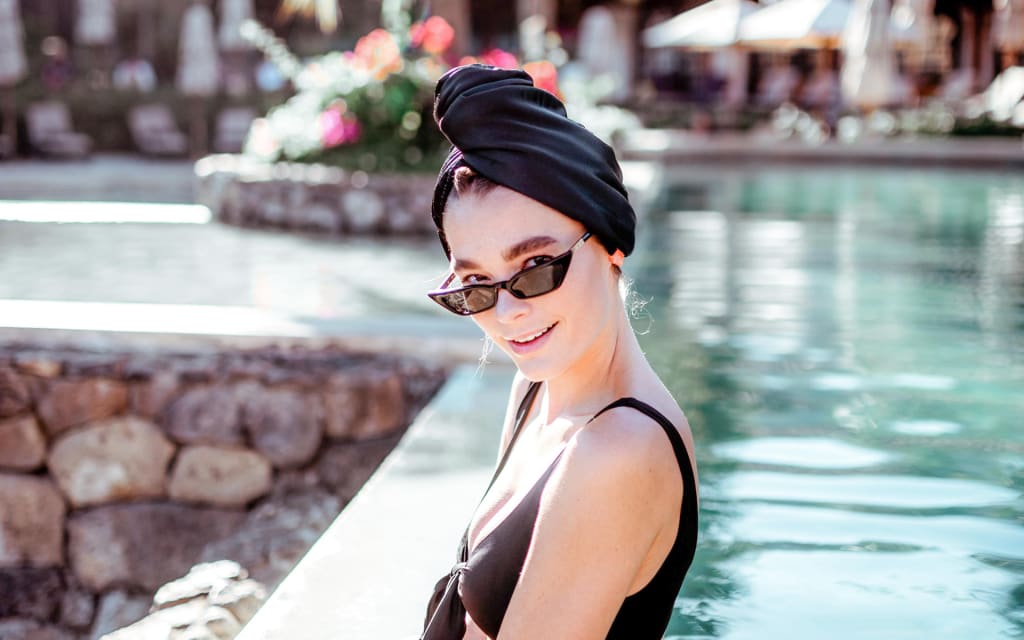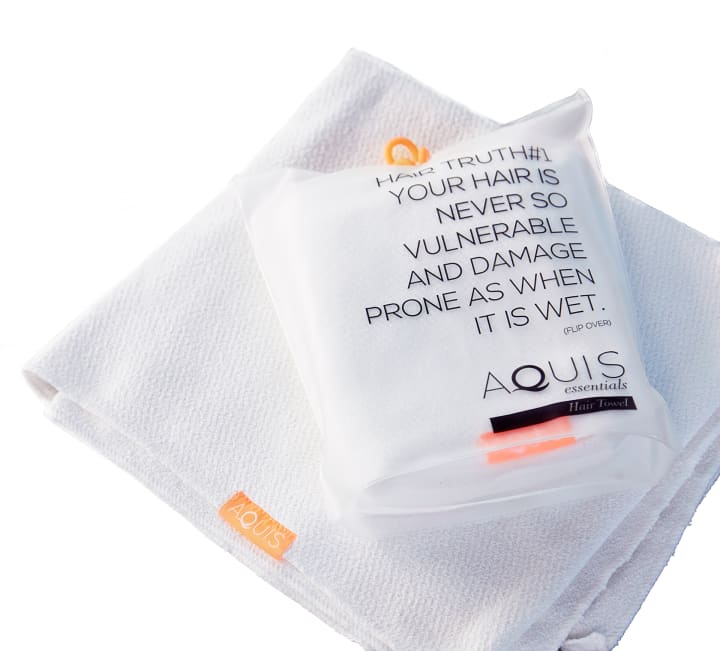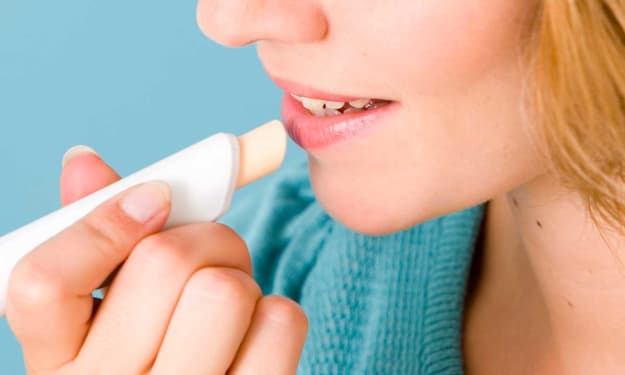Reasons Why Water is Bad for Your Hair
It's true. Too much water is bad for your hair, and could be the reason why your summer hairstyle is falling flat.

Water is something we all need in order to survive. Our bodies are made, mostly, of water. Studies have shown that regular water consumption improves health, boosts hair shine, and even helps even out skin tone. It’s no secret that water is great for us—but at times, it’s really not that great for our hair.
Though water is a great beauty tool when you drink it, water isn’t always good for you. This is especially true with your hair. Washing your hair with it or even having too much water in your hair can be seriously damaging for your locks.
Companies like Aquis have been working on creating technology to help prevent hair damage from excess water, and their work has led to better hair for those who want to keep their hair shiny. Once you hear the reasons why water is bad for your hair, you’ll understand why so many hair specialists swear by their products.
Excess water can strip natural oils that are meant to protect hair.
The most obvious reason why water is bad for your hair is the exact same reason why people who bathe too much get dry skin. Soaking in water for too long can cause your hair to dry out, primarily because water can wash away the protective oils that lock in the moisture in your hair.
Our scalps produce oil via sebaceous glands. This oil, in moderate amounts, gives hair the nice, shiny look we all love and improves hair strength. It also keeps hair soft and touchable. Not having this oil on our hair or scalps can mean dull, dry, or even damaged hair.
Hair’s high absorbency worsens the damage it experiences.

Believe it or not, hair’s natural tendency to absorb water tends to be one of the reasons why water is bad for your hair—and the less healthy your hair is, the worse the damage gets. Healthy hair can gain as much as 30 percent of its weight in water. Damaged hair gains as much as 50 percent.
One of the most important reasons why you need to get a specialized towel like the ones from Aquis is because that weight, even if temporary, causes hair to lose its tensile strength. This can cause hair to get brittle, weak, or even break.
The “swelling process” from wetting and drying hair can seriously wear it out.
Most hair experts advise against daily washing because of how much hair swells and shrinks during water exposure. With every exposure to water, hair will swell up to absorb water. As hair dries, it shrinks. Repeated swelling and shrinking often causes hair to get fatigued—which is often what causes split ends and breakage.
Experts agree that it’s a good idea to avoid daily washing, be careful with your hair when you do wash, and to dry off your hair without using heat to do so. This minimizes the swelling process and decreases your hair’s fatigue.

Let’s not forget how water strips away protective products we use on hair.
To a point, this can be a good thing. After all, we take showers to make sure that we can clean off the grit and grime accrued from daily life. This trait of water becomes problematic when we are trying to keep our hair a certain color or keep hair healthy using leave-in conditioners.
Water, particularly warm water, opens up your hair’s cuticles. If you stay too long in water, your hair’s surface layer will open up and release all those products into the water, leaving your hair completely threadbare.
A good towel, like the Aquis hair towel, can help prevent full stripping from happening if they are used correctly.
The impurities found in water are very damaging to hair, too.
Most people do not have the luxury of showering in 100 percent H2O. Even the cleanest tap water samples you’ll find will have some metals and impurities in there. Moreover, around 65 percent of all American households have hard water, which contains impurities that are specifically known to cause dull, damaged hair.
Hard water causes buildup that makes hair unmanageable, greasy, and at times, downright gunky. Even regular tap water can have similar issues if there are other impurities or chemicals added to it. Hair experts will tell you that getting good shower filters can curb this kind of damage when you wash your hair.
The chlorine that’s added to tap water or pool water may be the worst issue, in terms of impurities.
Part of understanding why hot water is bad for hair is understanding the main impurities that water contains. Chlorine is used to kill off bacteria in our tap water as well as in pools. If we didn’t use chlorine, we’d be getting a lot sicker.
The problem is that exposure to chlorine has long been known to cause hair damage and discoloration. We’ve all heard about people who went for a swim only to see their hair dyed green due to excess chlorination.
The longer the chlorine stays in your hair, the worse the damage gets. That’s why it’s smart to dry your hair quickly after you take a shower. Heavy chlorine exposure can even kill hair in certain cases. It makes sense to avoid having your hair get too wet for too long—if only for this reason.

Hot water increases the damage done to hair tenfold, by the way.
There are quite a few reasons why hot water is bad for your hair, with the most obvious reason being the way hair reacts to heat. Hot water opens up your hair quickly, which means that it makes your hair absorb more impurities, causes oils to strip themselves away, and also greatly impacts your hair’s ability to shrink back to size. The problem here is that most people prefer hot showers to cold ones—and typically will also resort to hair dryers to dry out their hair.
Excess exposure to hot water can also be a reason why you have greasy hair.
Ever notice how some people have both dry hair and greasy hair at the same time? Folks who have both dry and greasy hair are actually displaying signs that their hair has undergone some serious water damage due to hot showers.
Hot water doesn’t just dry out hair and exacerbate hair follicle damage; it also damages your scalp. When your scalp notices high heat, it responds by kicking oil production into overdrive. Meanwhile, your hair still has lost a lot of natural oils at the bottom. This causes a greasy scalp with dry hair ends.
Using a hot blow dryer can make this even worse. Using a hair towel that quickly dries your scalp without the heat that could trigger excess oil production, such as the ones by Aquis, is a good way to prevent this damage.
The common act of brushing your hair in the shower can also make tangles worse.
We’ve already discussed why water is bad for your hair, and explained why your hair is at its most fragile while wet. When you’re showering it up, it’s tempting to detangle your hair since water can make it easier to comb through. This is a pretty bad idea, though, since your hair is at its most brittle when swollen with water.
The pulling motions that people do with their combs is often enough to fray hair and cause breakage. This is why you might be struggling with combing your hair outside of the shower later on.
Allowing your hair to dry using a high-quality wicking towel could help prevent breakage on the ends of your hair.
Overall, there’s definitely too much of a good thing when it comes to hair hydration.
Water, undoubtedly, is really important to healthy hair and skin. However, too much water is bad for your hair and can even trigger hair loss. If you want to minimize the negative effects of water on your hair, make a point to wash your hair safely and choose a towel that dries hair evenly, quickly, and safely.
About the Creator
Aquis
We innovate haircare for adventurous women because you have better things to do than your hair. https://aquis.com/







Comments
There are no comments for this story
Be the first to respond and start the conversation.